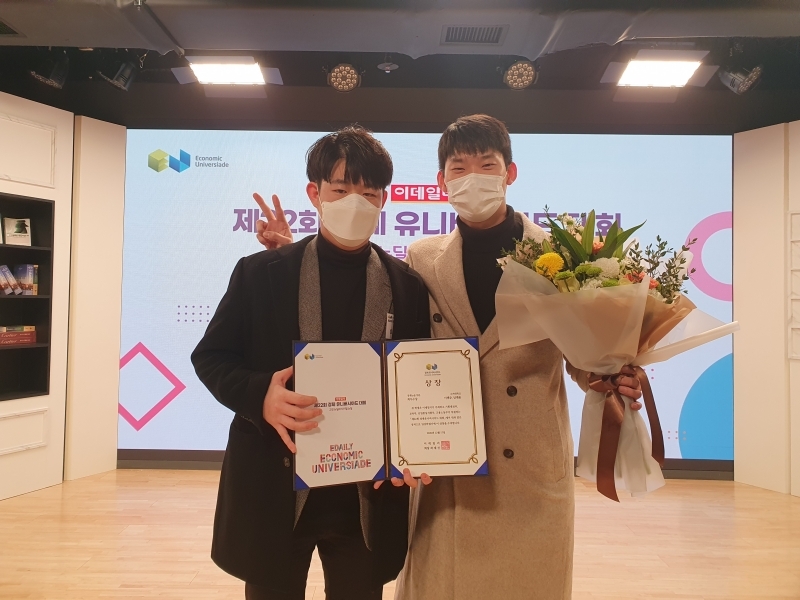News
KUBS News
KUBS students win excellence award in 22nd Economic Universiade

KUBS students, Nam Jae Yong(Business ’16) and Lee Taek Joon(Business ’17), won the excellence award in the economics essay field in 22nd Economic Universiade, hosted by E-daily and sponsored by Ministry of Strategy and Finance.
Economic Universiade competition is held every year to △develop career paths △enhance cognitive abilities △contribute to the real economy △foster globally talented youths. ‘Green New Deal and Digital New Deal’ was the topic for 22nd Economic Universiade competition. Undergraduates and graduate students participated and competed fiercely in four essay fields: △Economics △Employment △Industry △Education.
In the economics essay field, which Nam Jae Yong and Lee Taek Joon won the excellence award, participants were required to submit an essay within ten sheets (A4) and give a presentation about ‘the Green New Deal or Digital New Deal’s impacts on the Korean economy.’ In their major course, they further developed a model which they had previously worked on while preparing for KUBS Social Value Research Competition. The two students participated under the team name ‘Team KUBS(Korea University Business School)’ and showed their love for the school.
Q. Congratulations! Please briefly introduce your paper that received the award.
Our paper is about a policy plan that can enhance Korean Green New Deal based on a Korean Environment Impact Bond(EIB). This policy plan suggests ordinary citizens as direct investors for environmental projects and aims to open a financing source.
Social Impact Bond(SIB) is a type of social financing that aims to solve social or environmental issues while also generating profit. It is a contract that receives capital from private investors and evaluates provided services and returns profits to investors based on how well social aims were met. EIB is a type of SIB and normally focuses on solving environmental issues. SIB started off to solve social problems, but recently it has evolved to incorporate environmental issues as well. It was first introduced in 2016 when Baltimore and Washington D.C aimed to expand its sewage facility related infrastructure to prevent the flooding of wastewater and heavy rain. Atlanta was the first to invite citizens and ordinary investors to EIB.
We researched Atlanta’s EIB case and worked to uncover a new approach to Green New Deal with EIB. New Deal projects have longer investment periods, higher risk and public characteristics which leads to mediocre profit rates. Therefore, we thought that it would be difficult for funds to be invested in New Deal projects if we leave it to the market and started to devise methods to enhance New Deal related funding.
We suggested K-EIB, which has the following characteristics. △The public sector such as the government and policy financing institutes take charge of initial investment and bare the costs and risk when raising funds for Green New Deal projects. △Various tax benefits should be provided to private funds to ensure their profitability. △EIB should be divided into three layers and the government should invest in each layer’s last ranked stake to bare capital loss and reinforce credit ratings of these investments to attract private funding.
In the post-COVID era, we think the New Normal will be ‘Untact(Transition to Digital)’ and ‘Eco-friendly.’ Jeremy Rifkin, the author of 『Global Green New Deal』, predicts that profits to natural resources will be privatized and the cost of destruction will transform civilization from the Era of Progress to the Era of Resilience. We hope that in the face of these trends, K-EIB will be used for Green New Deal projects and be a core pillar for a Korean Green New Deal.
Q. We heard that this was developed from an idea you thought of during your major courses.
We met while preparing for ‘2020 Social Value Research Competition.’ We researched various investment strategies based on social value and got to know impact investing and social finance. We conducted a research on SIB, one of many business models that were profitable. We gave a presentation on the SIB model we researched and received feedback from Professor James L. Park in his ‘Corporate Finance’ lecture. We developed this idea based on the feedback we received. We also participated in ‘LG Global Challengers’ competition with the recommendation of professors and worked hard to utilize our model in real policies. The feedback we received from professors during lectures and competitions helped us improve our SIB model. We think applying this model to the Green New Deal project, which the government is currently leading, was key in receiving the award.
Q. How do you feel about winning the award?
Jae Yong: It is an honor to contribute to KUBS. The various activities we did on campus was the foundation to receiving the award.
Taek Joon: It’s a great honor to glorify KUBS with the achievements that were based on what we learned in our lectures. I want to share this joy with the school and Jae Yong who worked hard every night together!


